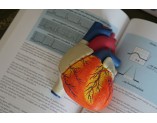Diabetes
Diabetes affects nearly 20% of Americans over the age of 65 and an additional one-fourth of the elderly population suffers from impaired glucose intolerance (insulin resistance) due to the general effects of aging, weight gain and more sedentary lifestyles.
Although the problem of diabetes is often described in terms of its impact on middle aged adults, the effects of the disease on senior citizens are far more difficult to manage, care for and treat.
What is diabetes?
Diabetes is a metabolic disorder that occurs either when the pancreas does not create enough insulin or when the body cannot efficiently use the insulin it produces. Insulin is a hormone that regulates blood sugar. Hyperglycemia (elevated blood sugar), is a common result of uncontrolled diabetes and over time leads to severe damage to many of the body's organs, particularly the nerves and blood vessels.
Type 1 diabetes
Type 1 diabetes (more commonly known as juvenile or childhood-onset) is signified by a lack of insulin production and requires daily management of insulin. The cause of type 1 diabetes is not known and it is not preventable.
Symptoms consist of an excessive secretion of urine, constant hunger, thirst, fatigue, weight loss and vision complications. These symptoms may vary from occurring suddenly to occasionally.
Type 2 diabetes
Type 2 diabetes occurs when the body does not produce enough insulin for proper function, or the body does not react to insulin (insulin resistance).
Approximately 90% of all diabetes cases worldwide are type 2.
Some people are able to control their type 2 diabetes symptoms by losing weight, following a healthy diet, exercising and monitoring their blood sugar levels. Nevertheless, type 2 diabetes is typically a progressive disease as it gradually worsens over time. Those who are diagnosed with type 2 diabetes will most likely have to manage the disease with some form of insulin.
Overweight and obese people have a much higher risk of developing type 2 diabetes compared to those with a healthier body weight. People that have a large amount of visceral fat, also known belly fat are especially at risk. Being overweight or obese causes the body to release chemicals that can weaken the body's cardiovascular and metabolic systems.
Gestational diabetes
Gestational diabetes, in most cases, is a temporary form of diabetes in which the body does not produce a sufficient amount of insulin to regulate sugar metabolism during pregnancy.
Signs and symptoms of diabetes
Individuals can experience varied signs and symptoms and at times there may be no signs at all.
Some of the signs and symptoms commonly experienced include:
- Frequent urination
- Excessive thirst
- Increased hunger
- Weight loss
- Tiredness
- Lack of interest and concentration
- Frequent infections
- Slow-healing wounds
- Poor circulation
- A tingling sensation or numbness in the hands or feet
- Blurred vision
When to get help
Being aware of the associated risks of diabetes is one of the most significant things you can do to make certain your loved one receives proper care at all times. Another important element of care is customization. Diabetes affects everyone differently and every person needs a personalized diabetes care plan. What works for one person may not be the best course of treatment for another, since some people may have one or more diabetes complications.
If your loved one suffers from complications associated with diabetes and needs additional care or help with everyday activities, then it might be time to consider some form of long term provision that specializes in diabetic elderly care.
Long term care is a type of personal care provided on an extended basis for people who need help with certain activities every day. It can include bathing, dressing, feeding, managing and administering medication and monitoring blood sugar. In addition, it can be provided at home, an assisted living facility, a residential care home or in a nursing home.









